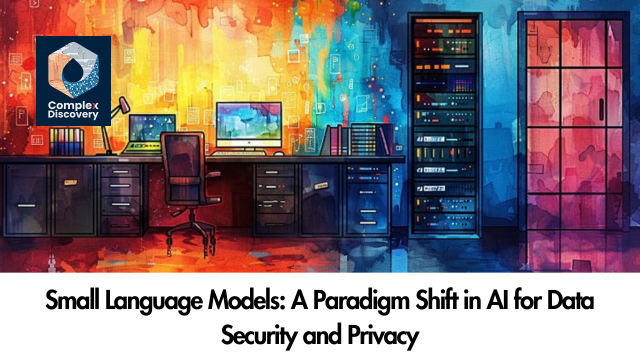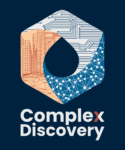
[EDRM’s Editor’s Note: This article was first published here on July 8, 2024, and EDRM is grateful to Rob Robinson, editor and managing director of Trusted Partner ComplexDiscovery, for permission to republish.]

ComplexDiscovery Editor’s Note: As data security and privacy become increasingly crucial, small language models (SLMs) are emerging as essential tools for businesses and the public sector. Upstage Co. Ltd., an AI startup, is at the forefront of this shift, offering SLMs that can be deployed on-premises or in private cloud environments to protect sensitive data. This article explores the growing use of SLMs, their advantages over large language models (LLMs), and recent advancements in masked language models (MLMs) and conversational intelligence. Through strategic partnerships and practical applications, industry leaders are pushing the boundaries of AI, ensuring secure and efficient operations while upholding high data governance standards and ethical considerations.
In the field of artificial intelligence (AI), small language models (SLMs) are emerging as a critical tool for businesses, particularly within the public sector, to enhance data security and privacy. Upstage Co. Ltd., an enterprise AI startup, has been at the forefront of this shift, offering SLMs that can be deployed on-premises or within private cloud environments to safeguard sensitive data. “What we do is we build a small language model that can be deployed privately in customers’ on-premise or private cloud environments,” said Kasey Roh, head of U.S. business at Upstage Co. Ltd., in an interview with SiliconANGLE Media’s livestreaming studio, theCUBE Research, at the AWS Summit in Washington, DC. “Enterprises have a lot of confidential customer data or public data. They can’t take it outside of their containerized database and want to train the model using that specific data, and also run and operate and manage the data model within their own cloud environment. With that end-to-end data pipeline along with the model is what we offer at Upstage.”
What we do is we build a small language model that can be deployed privately in customers’ on-premise or private cloud environments.
Kasey Roh, head of U.S. business at Upstage Co. Ltd.
The transition from large language models (LLMs) to SLMs is gaining traction due to the latter’s ability to provide more targeted, cost-effective, and secure solutions. Unlike LLMs, which are broad and often expensive, SLMs are tailored for specific use cases, according to Roh. “What we offer is having a small size model that is very good at one use case, one specific use case,” she said. Upstage has emphasized its commitment to accuracy and security by implementing additional layers of verification, including a groundness checklist to ensure data integrity. “That comes down to the RAG application or we have a groundness checklist, which means once the model spits out the answer, the answer goes back to the sourcing data, the underlying data to double-check the accuracy of the data.”
Partnerships with major cloud service providers play a significant role in Upstage’s operations, particularly their collaboration with Amazon Web Services Inc. (AWS). “AWS has been a phenomenal partner for Upstage,” Roh noted. “We are certainly training our model in the AWS environment, but our models are also hosted on AWS Marketplace and our models are available on SageMaker. When we meet the customers who are either already in AWS, their data is already on AWS or they are considering being in AWS environment, we are able to package our model offering with the AWS cloud environment to supercharge the model training and the continuous serving of the model.”
AWS has been a phenomenal partner for Upstage.
Kasey Roh, head of U.S. business at Upstage Co. Ltd.
The usage of SLMs is not limited to the private sector; public entities are also exploring their potential. At the AWS Summit, Upstage demonstrated applications in various verticals, including legal and public services, aiming to tackle specific challenges in these domains. “We are seeing a lot of vertical solutions, leveraging certain problems the lawyers are facing,” Roh said. “In this DC Summit, we’re seeing a lot of solutions that are trying to tackle the public use cases, like how can the federal government use the foundation models? So, I think that the next opportunity is really at the application layer, leveraging the foundation model.”
Meanwhile, Large Language Models (LLMs), despite their extensive capabilities, face challenges in terms of cost, scalability, and security. Geniusee, a company specializing in LLM-based solutions, uses advanced technology to offer AI-driven services tailored to clients’ needs, supporting businesses in integrating these models into their operations. LLMs employ self-supervised learning to predict the next word in a sequence, enhancing their ability to understand and generate human language. The models can be used across various applications, including customer service, content creation, and sentiment analysis.
Delta Airlines, for instance, has successfully implemented an LLM-based chatbot named “Ask Delta” to assist customers with flight check-ins, luggage tracking, and flight information, leading to a 20% reduction in call center volume. “This implementation has led to a 20% reduction in call center volume,” according to sources at Delta Airlines. Similarly, The Washington Post employs an LLM named Heliograf to automate aspects of content creation, allowing journalists to focus on more nuanced reporting. LLMs can also analyze consumer sentiment through extensive data from social media, reviews, surveys, and online forums, providing businesses with insights to refine their offerings. Amazon leverages LLM-based sentiment analysis to assess product reviews and understand customer satisfaction, identifying trends and patterns to better align with market demands.
What we offer is having a small size model that is very good at one use case, one specific use case.
Kasey Roh, head of U.S. business at Upstage Co. Ltd.
In addition to LLMs and SLMs, Masked Language Models (MLMs) are making significant strides in natural language processing. Unlike traditional causal language models, MLMs can attend to words on both sides of a masked token, offering a bidirectional approach to language comprehension. MLMs like BERT, offered by Hugging Face, excel in tasks such as text classification, named entity recognition, and sentiment analysis due to their extensive training on large datasets. Their ability to handle ambiguous language, contextualize words, and disambiguate meanings makes them invaluable for improving language understanding. “MLMs can handle ambiguous language,” according to industry experts. “Their ability to access both preceding and succeeding words allows for a deeper comprehension of the semantics and sentence structure.”
A notable example of MLM application is in conversational intelligence platforms, which use AI to optimize communications and business processes through advanced speech-to-text and generative AI technologies. Universal-1 from AssemblyAI, a speech-to-text technology trained on 12.5 million hours of multilingual audio data, serves as a cornerstone for these platforms, offering high accuracy in diverse conditions such as varying accents and background noises. “Universal-1 is designed to account for conditions like background noises, accents, and language switching,” stated representatives from AssemblyAI. Its integration facilitates the creation of more natural-sounding conversational AI, aiding in tasks like drafting emails, logging calls, and providing automated coaching in real-time.
The introduction of generative AI further enhances conversational intelligence, offering capabilities to summarize meetings, generate notes, and conduct sentiment analysis on-the-fly. “Generative AI is used to create more natural-sounding conversational AI,” said experts at AssemblyAI. Additionally, the technology supports virtual assistants in managing everyday tasks, improving efficiency and user experience. Samsung’s Bixby, for instance, utilizes generative AI to control devices, manage schedules, and translate languages, making it a versatile tool for both personal and professional use.
The ongoing advancements in AI, from SLMs and LLMs to MLMs and conversational intelligence, underscore a transformative era in technology. Companies like Upstage, Geniusee, and others are at the helm of this evolution, pushing the boundaries of what AI can achieve. Yet, as noted by industry leaders, the importance of responsible AI governance and ethical considerations remains paramount. The collaboration between tech firms and public institutions continues to be a driving force in ensuring that these technologies are integrated securely and effectively, paving the way for innovations that not only enhance business operations but also adhere to the highest standards of integrity and public trust.
Read the original release here.
News Sources
- Generative AI applications revolutionize technology and innovation
- How Conversational Intelligence Platforms Are Using AI in 2024
- An explanation of masked language models
- Harnessing the Power of Large Language Models (LLMs) for Business Transformation
- Small language models enhance AI security and privacy
Assisted by GAI and LLM Technologies
Additional Reading
- Meta’s AI Expansion Faces Regulatory Roadblocks in Europe and the US
- Combating AI Hallucinations: Oxford Researchers Develop New Detection Method
Source: ComplexDiscovery OÜ
Assisted by GAI and LLM Technologies per EDRM GAI and LLM Policy.

